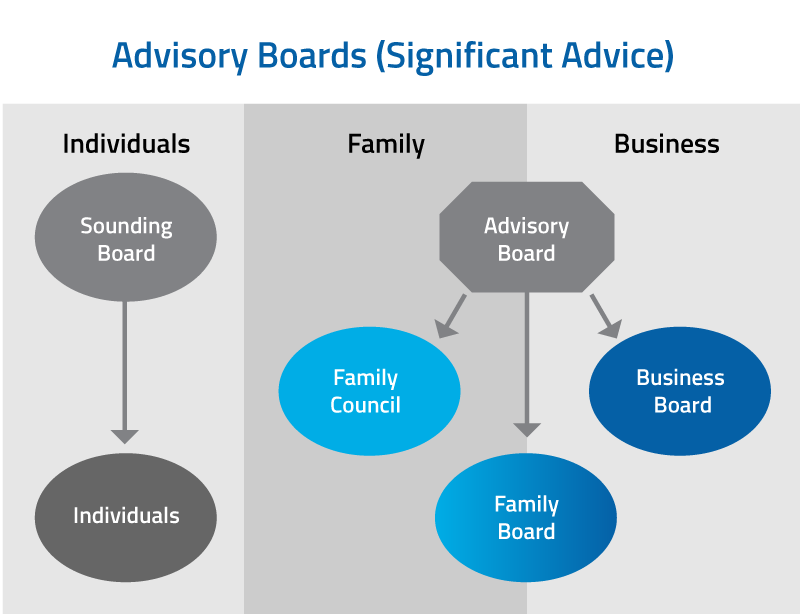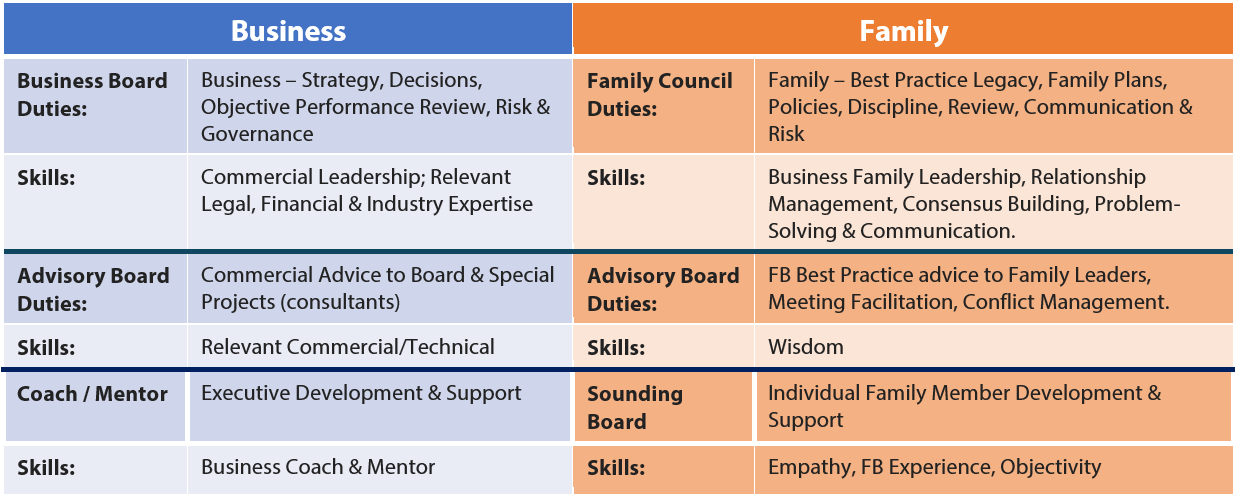Advisory Boards
Concepts:
At some or many times, all Family Businesses face “significant challenges”. FBI advisers respond with “significant advice”, rather than just “technically correct advice”.
Consultants provide solutions for “technical” problems, within specified contexts.
Advisers establish context to provide wise advice in response to almost any client need.
Consultants with sufficient knowledge, experience, skill and judgment to be considered “wise” can transition some or all of their work into family business advisory, or Advisory Board appointments. Their roles may span everything from Mentor to Personal Sounding Board, to Family Council and/or Business Board guidance.
Form: Advisory Boards are problem-solving, face-to-face and/or virtual forums, where “significant” challenges are raised, discussed and resolved, courageous advice is freely provided, solutions are developed collaboratively, and new ideas and opportunities are introduced and refined.
Advisory Boards have no decision-making authority. They only provide advice.
Advisory Board members counsel, advise, guide, and facilitate, rather than perform operational activities, although many Board members are initially engaged for their technical expertise (eg: legal, accounting, family business best practices, and succession planning). After proving their competence and trustworthiness, they’re invited to stay on to help family and/or business leaders deal with a wide range of other challenges.
And that’s where problems arise through scope drift and fuzzy engagement parameters.
The best Boards remain strategically objective, which is hard to do when members are engaged in operational activities. FBI training emphasises the need for a well-structured approach to Advisory Board operations so both clients and advisers find themselves in the engagements they want, with everyone getting the outcomes and rewards they deserve.
Advisory Boards often collaborate with external networks of trustworthy advisers – members call on reliable colleagues to undertake sensitive and specialised tasks (eg: psychological support for troubled family members and complex HR projects).
There were over 660,000 Advisory Boards operating in 2023. Mostly in the USA.
Types of Advisory Board
- Sounding Board (for individuals) – usually a single adviser, acting as mentor, coach, facilitator, and strategic problem-solver. Like a “professional friend in need”.
- Family Advisory Board (for families) – one or two advisers work with a Family Council, or Family Board, as mentor, coach, best practice adviser, meeting facilitator, and strategic problem-solver.The role is part expert governance / business adviser, and part “wise old Uncle Bob / Auntie Grace” – the guy or girl everyone in the family respects and listens to. Key responsibilities include maintaining focus, thinking, and decision-making on family stuff, when in family-mode, and on business stuff, if/when in business-mode.
- Business Advisory Board (for family businesses) – one or two advisers work with a Business Board as mentor, coach, independent governance adviser/appraiser, meeting facilitator, and strategic problem-solver. The role is mainly business-focussed, with an appreciation of what family owners need and expect from their business(es).This is more like a conventional director’s role, with additional responsibilities for maintaining the focus of family board members on business thinking, and decision-making, rather than on the family issues that should be addressed in a wholly different environment.

Types of Boards





